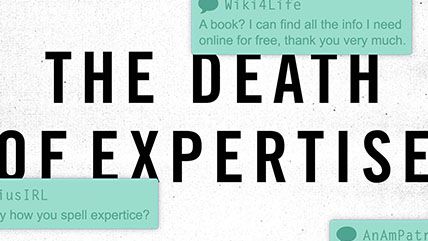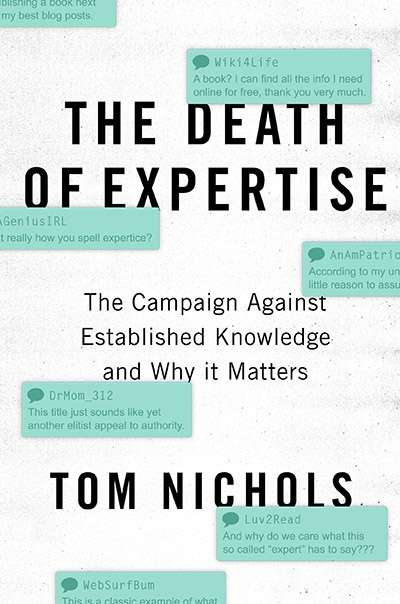The Limits of Expertise
A defense of experts exhibits the very problems it complains about.


The Death of Expertise: The Campaign Against Established Knowledge and Why It Matters, by Tom Nichols, Oxford University Press, 272 pages, $24.95
Believe the experts! Experts are not perfect, but they are more likely than non-experts to be right. Experts know what they do not know, and are therefore more cautious and better able to self-correct. Sometimes, in small ways, non-experts may outperform experts. But in general, America and the world need more respect for expertise.
That is the thesis of Tom Nichols' The Death of Expertise: The Campaign Against Established Knowledge and Why It Matters. It is also, as it turns out, a critique of the book itself. Nichols, a professor at the U.S. Naval War College, is an expert on Russia and national security; he is not, however, an expert on expertise.* His hand wringing about kids today is not grounded in a scholarly background in education policy or the history of student activism. He is a generalist dilettante writing a polemic against generalist dilettantes. As such, the best support for his argument is his own failure to prove it.
There are two central flaws in The Death of Expertise. The first is temporal. As the title implies, the book is written as though there were once a golden age when expertise was widely valued—and when the democratic polity was well-informed and took its duty to understand foreign and domestic affairs seriously. "The foundational knowledge of the average American is now so low that it has crashed through the floor of 'uninformed,' passed 'misinformed' on the way down, and finally is now plummeting to 'aggressively wrong,'" Nichols declares. His proof for this statement is that "within my living memory I've never seen anything like it."
As Nichols would ordinarily be the first to point out, the vague common-sense intuitions and memories of non-experts are not a good foundation for a sweeping theory of social change. Nichols admits that Americans are not actually any more ignorant than they were 50 years ago. But he quickly pivots to insist that "holding the line [of ignorance] isn't good enough" and then spends the rest of the book writing as if he didn't know that Americans are not getting more ignorant.
The myth of the informed democratic voter is itself an example of long-ingrained, stubborn anti-knowledge. In their brilliant new Democracy for Realists (Princeton University Press), the political scientists Christopher H. Achen and Larry M. Bartels explain that laypeople and experts alike have developed a "folk theory" holding that American democracy is built on an engaged electorate that casts its votes for rational policy reasons. Unfortunately, as Achen and Bartels demonstrate, decades of research have shredded this theory, stomped on it, and set the remains on fire.
In fact, Americans have long been so uninformed that they barely can be said even to have opinions at all, much less wrong ones. In one of the most extreme examples in Achen and Bartels' book, New Jersey voters in 1916 opposed Woodrow Wilson because they'd experienced a freak series of shark attacks. The president had no way to stop the sharks, but that didn't stop voters from punishing the incumbent for them. (Or at least that's how Achen and Bartels interpret the electoral data. Other experts disagree, as experts will.) Nichols thinks democracy is threatened because Americans know so little about policy, but if democracy depended on Americans knowing something about policy, Achen and Bartels argue, the United States would have collapsed long ago.
Nichols' lack of historical perspective on ignorance is mirrored by the second central flaw in his book: a lack of historical perspective on knowledge.
Nichols does admit that experts can be wrong in numerous ways. They sometimes make outright mistakes, as when nutritionists decided that eggs were bad for you. They may use their authority to talk about issues beyond their area of expertise, as Nichols himself does. They may also stray from description into prediction, where they are as likely to be wrong as anyone else. And they have been known to deliberately fudge studies, sometimes because of a financial conflicts of interest, sometimes to advance their careers by generating more newsworthy, publishable results. All this is discussed in the book.
But The Death of Expertise doesn't grapple with the most serious way expertise can be flawed. Individual expert failure is relatively minor. The real damage occurs when entire fields are built on error or, worse, on prejudice. A century ago, biology, medicine, and sociology all broadly accepted a racist and eugenicist consensus. To be an educated elite at that time meant to believe in the scientific basis of racism. American eugenic theories were picked up and used by Hitler, so this particular expert failure is implicated in horrific acts of genocide.
Nor is this kind of systematic expert bias limited to the past. American birth practices have swung strongly toward medicalization over the last 100 years, as doctors and obstetricians have wrested control over pregnancy and delivery from midwives. Maternal mortality actually rose among the upper classes as credentialed experts took over a process they didn't fully understand, introducing new risks of infection and birth injury with their interventions. Those numbers have since dropped, but even today, American doctors continue to perform Caesareans at alarmingly high rates and to rely on controversial technologies such as electronic fetal monitoring.
You could argue that this is simply another case of expertise being neglected—perhaps medical doctors are failing to pay attention to the research of scientific experts. But this kind of contest between competing groups of professionals isn't what Nichols means when he talks about the death of expertise. The arguments between doctors on one hand and midwives (or researchers) on the other isn't about ignoramuses fighting experts. It's a contest between different groups with different priorities and incentives. It's a struggle about power as much as it is one about knowledge.
The institution of the expert is, after all, basically a system for turning knowledge into power and vice versa. Licensing, credentialing, and peer reviewing are a way to certify that certain knowledge is valid. But they are also a way of conferring respect, authority, and status on certain speakers. When that authority and power is misused, you can't always expect experts to self-correct. The hard work of dethroning eugenics and race science was done by the Holocaust, which discredited both, and then by the civil rights movement. Experts didn't just decide to reverse themselves.
Nichols is certainly correct that the internet has spread a lot of dubious conspiracy theories and ignorant bluster. When he writes that "everything becomes a matter of opinion, with all views dragged to the lowest common denominator in the name of equality," he offers a good thumbnail description of just about every website comments section ever. But Nichols seems largely oblivious to the virtues of allowing non-credentialed people a chance to challenge the experts. In the past, to give just one example, experts could talk about transgender people all day every day, making invidious policy recommendations and promulgating stereotypes without fearing contradiction. The internet has made it possible for trans people to talk about their experiences and challenge expert interpretations in ways that were not possible before. (See Deirdre McCloskey on her own experience on page 12.) The resulting conversations have certainly been frustrating for many experts. But the previous expert-only conversations were frustrating, and in some cases life-threatening, for trans people.
Even Donald Trump doesn't fit so simply into the death-of-expertise narrative. It's true that his election demonstrates that an influential minority of voters are broadly uninterested in traditional expertise. It's also true, as Nichols notes, that Trump ran a campaign that sneered at elites and experts. Nonetheless, his election was enabled as much by elite failure as by anti-elitism. Professional politicians, both Republican and Democrat, stumbled repeatedly by underestimating Trump. Journalists were convinced that he couldn't win and shaped their coverage accordingly. Experts and non-experts, ignorant and enlightened, all had to work together to create a catastrophe like 2016.
Experts will undoubtedly be studying Trump's victory for decades. But they're not likely to find answers in polemics about how ignorant Americans don't respect smart people anymore.
The balance between trusting experts and challenging conventional wisdom is always difficult. How do you create discussions online where folks who have been traditionally marginalized are welcome without empowering bad actors determined to harass them or spread disinformation? How can political parties encourage participation and democratic engagement without opening themselves up to opportunists and quacks? Those are questions worth asking, but Nichols, alas, is not the writer to answer them. Someone with more expertise is needed. Or, possibly, with less.
*CORRECTION: The original version of this article claimed that Nichols lacks credentials in political science. That is incorrect and the claim has been removed.
This article originally appeared in print under the headline "The Limits of Expertise."


Show Comments (71)